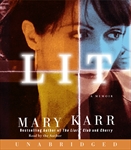Addictions – Part 2
0 In Lit, Mary Karr takes us through the journey of her alcoholism. While she and Clegg share the fact that they inhabit literary circles (Karr is a poet and writer), that is about all these two memoirs have in common. Karr is a woman who one would think might “know better” than to lose herself in alcohol. Growing up with a mother who seemed alternately dangerous (butcher knife!) to downright flaky and sauced, not to mention her drinking father, she seemed to know what she didn’t want to be.
In Lit, Mary Karr takes us through the journey of her alcoholism. While she and Clegg share the fact that they inhabit literary circles (Karr is a poet and writer), that is about all these two memoirs have in common. Karr is a woman who one would think might “know better” than to lose herself in alcohol. Growing up with a mother who seemed alternately dangerous (butcher knife!) to downright flaky and sauced, not to mention her drinking father, she seemed to know what she didn’t want to be.
Unlike Portrait, where we are immersed almost entirely in Clegg’s world and its deterioration, Karr shares the personalities of family, the atmosphere of environment, her role as wife and mother and struggling poet. She’s very up front with helping us get to know her as a person and the experiences and people that shaped her.
And whereas Portrait shared an addiction that carried him away, Lit shows Karr’s constant struggle to reign herself in. She knows she doesn’t want to be this way, but she can’t stop, though she keeps making herself promises to do just that.
Karr has a lot of responsibilities—her work, her role as primary caregiver, wife in a struggling marriage—and she wears herself out seeing to all of them. Her need to drink lurks through it all. She gets to her job at the college hungover daily it seems, she fears throwing up in front of the other mothers at the daycare center in the morning, she hides bottles around the house. She’ll have what she says is her last drink one night, but in the morning when she finds the glass with a bit still in it, her mind reasons that she might as well drink it, as it would be a waste to throw it away. She is aware of her “bad behavior” but a drink just helps too much.
Karr too reaches her limit, and when she has an accident in which she believed she was about to die and leave her young son motherless, she has her “moment of clarity.” Though Clegg has another book on his recovery (Ninety Days, which I’ve not read), Karr takes us along on her cynical journey to sobriety too.
She reluctantly begins to attend AA meetings though she claims she doesn’t “get it.” She forms the bonds she needs to with the people who can defend her against herself, but, a lifelong atheist, she just can’t put her mind around the thought of a “higher power” that the others rely on and give credit to. But as she makes herself break down her walls and start to give thanks and to ask for help, to whatever her yet unidentifiable higher power is, she begins to notice the funny ways it seems to help.
In many ways, Lit is just as much a journey of Karr finding religion as it is her finding sobriety. But she is in no ways overpowering or preachy as she does it. Despite the heaviness of the topics (alcoholism, a damaged marriage, recovery), Karr maintains a good sense of humor and a sarcastic tone, helping to really see her at her best and not just judging her at her worst.
